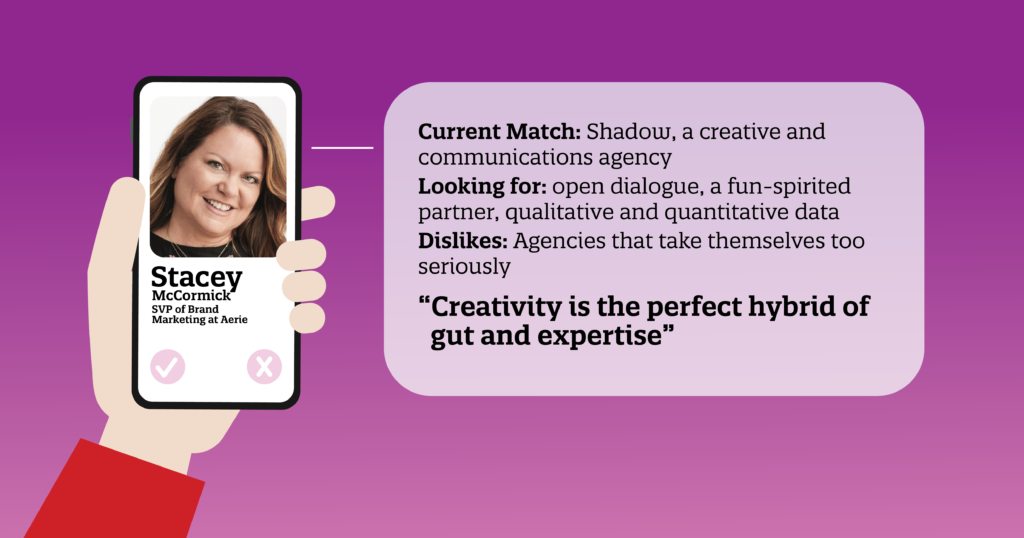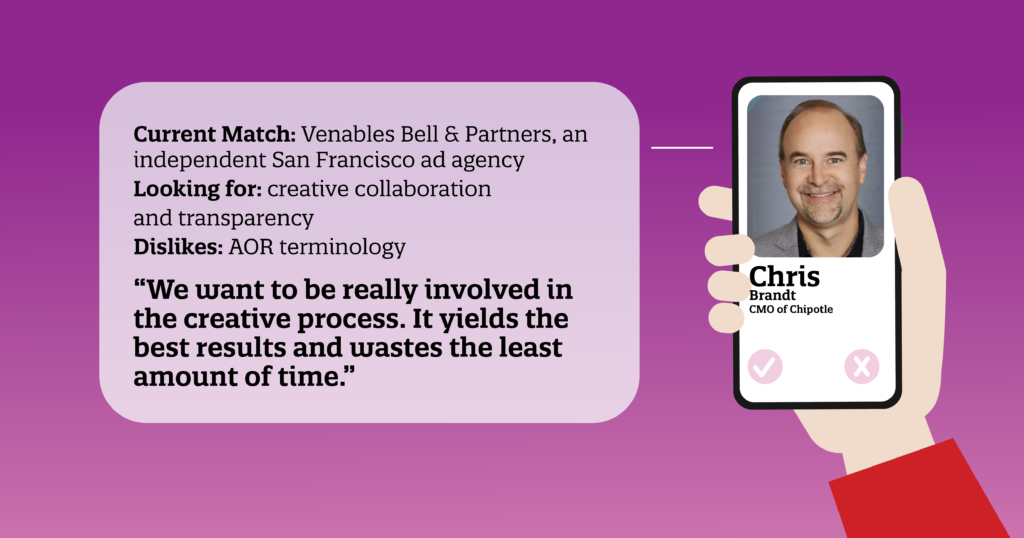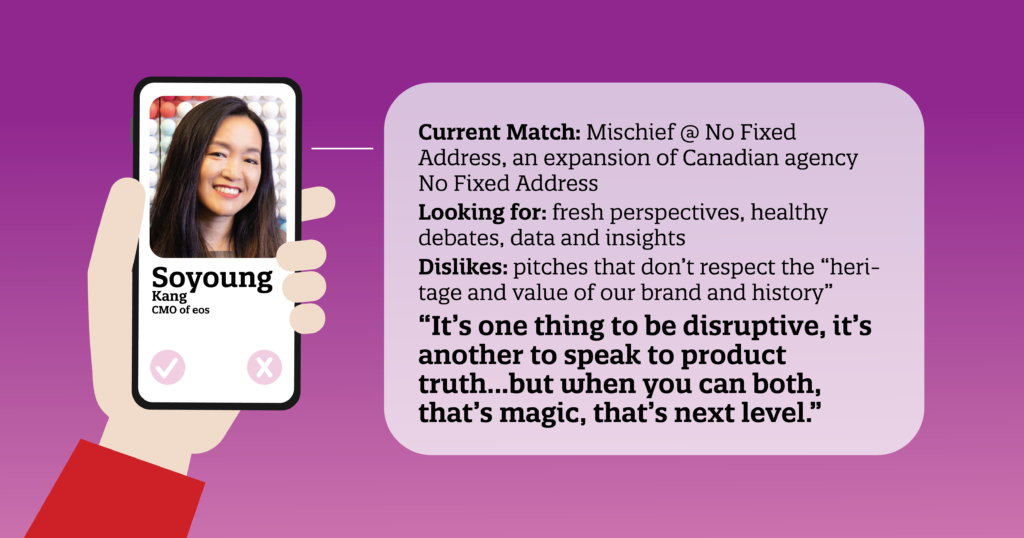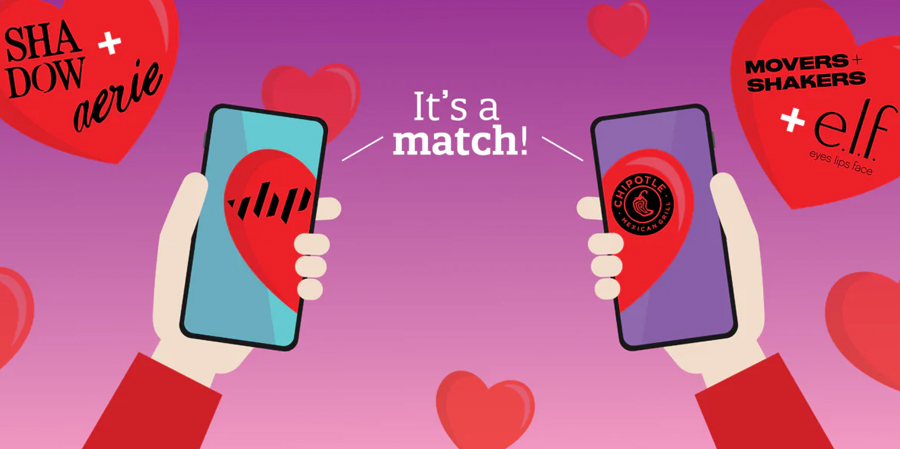Before settling down with Chipotle, Chris Brandt had been around the block. The chief marketing officer has made stops at General Mills, Coca-Cola and Taco Bell, so he’s learned a thing or two about working with ad agencies. And just as all symbiotic relationships require loyalty, determination and dedication, Brandt advises against jumping ship on an agency after hitting a roadblock, as the right synergy cannot always be replicated.
“The grass isn’t always greener,” he told Adweek. “Giving agencies feedback is a tremendous skill. It’s not enough to just say ‘I don’t like this.’ You need to have seen enough creative to actually give effective feedback.”
Finding the right ad agency is a lot like dating: some partnerships will fail miserably, others will exemplify the perfect chemistry and each eligible bachelor will carry with them their own set of red flags and baggage that is symbolic of past relationship mistakes. But unlike romantic partnerships, agencies are constantly under pressure to articulate their purpose, which is often subject to questioning and scrutiny. Agencies must be clearer than ever in defining their role in the marketing ecosystem, so Adweek asked 12 CMOs and top marketers to share what exactly they look for in these partnerships. Here’s what they had to say.
Finding the right match
When Kirstie Foster, the senior vice president of marketing at global agribusiness cooperative CHS, worked at an agency that held a motorcycle brand as a client, she got her motorcycle license in an effort to “fully understand the consumer experience.” Similarly, Foster believes that CHS’ 26 year relationship with Colle McVoy has been defined by the agency’s commitment to internalizing the company culture and the needs of its customers.
“At CHS, (internalizing the brand) might mean talking to local farmers, spending the day as a ranch hand, engaging with agricultural influencers online or attending farming events or trade shows,” she said.
Brandt also prioritizes viewing the client’s business as an extension of their own—he stressed that the best and most reliable agencies “treat your money like it’s their money.” Erin Harris, CMO of Lobos 1707 Tequila, and Stacey McCormick, senior vice president of brand marketing at Aerie, both view their agency partners as natural extensions of their in-house marketing teams.
“Our wins are their wins, our losses are their losses,” said McCormick. “We are continually learning and growing together through hindsights and learnings as we develop each new campaign.”

When selecting marketing partners, brands look for agencies that know how to avoid weighing down their ideas with corporate jargon and don’t get too caught up in the formal pitch process. Sang’ona Oriedo, vice president of marketing at digital healthcare company iRhythm, says an inability to communicate with clarity and brevity is a huge turn off.
“No matter what subject is being addressed—the category, the product or the audience—a lay-person should be able to read any brief or receive any pitch and understand it,” she said.
Russell Wager, vice president of marketing at Kia America, believes the best agencies know how to offer a range of creative ideas, from conservative to innovative. Kia has been able to develop this balance throughout its more than 20-year relationship with creative agency David & Goliath.
“Sometimes it’s a little more mellow communication, and sometimes it’s a Super Bowl spot all about an electronic dog that doesn’t really have a single product feature in it, but does a really good job of getting awareness for our EV 6,” he said. “They always give us a range.”
When it comes to immediate red flags, brands no longer look for agencies that present creative strictly backed by a “gut feeling,” opposed to meaningful data and consumer research. According to Wager, “gut-feel decisions are falling by the wayside.”
“The proof is in the pudding, so anyone who cannot provide viable client references or case studies, provides a one-size-fits all plan or an unrealistic guarantee of success always causes concern,” said Jesus Valdez, vice president of integrated marketing at Pourri (formally known as Poo-Pourri). “A lack of financial transparency is a big flag for us as well.”
Crafting a healthy relationship
Most brands want to be heavily involved in the creative process, and as Brandt put it, they are not interested in suddenly being delivered a “big dog and pony show” after months of being left in the dark.

“I love the idea of demystifying the creative process and not having creative presentations feel like the ‘big reveal.’ Ideas and creativity are a team sport,” said Melissa Wildermuth, global creative director at General Mills, adding that “a creative presentation should feel like the beginning, not the end.”
When crafting a meaningful agency relationship, brands prefer to communicate directly with creatives and media buyers, as opposed to playing a “game of telephone” through account managers, according to Brandt. Chris Luna, consumer business group senior global manager at 3M, wants to meet everyone on Colle McVoy’s media team.
“Sure, not everyone needs to be in every meeting of course, but we find opportunities…to get to know everyone as a person beyond faceless names on an org chart,” he said. “Honestly, this builds trust and relationships, and we have a lot of fun together, too. And you can’t underestimate how having fun can lead to amazing work and value.”
Like in any healthy relationship, brands want agencies that don’t just constantly feed them what they want to hear—they are looking for debate, respectful disagreement and challenge.
“Early in my career, one of the biggest issues that I encountered with agencies is that people tried to fix something that wasn’t fixable,” said Brandt. “You need to be candid and clear when offering why you don’t like it.”
When things don’t go as planned, building a correction plan based on honest communication is critical.
“Agencies don’t wave magic wands, and experimentation and optimization is a crucial operational aspect of digital-first marketing,” said Mandy Dhaliwal, CMO of software company Boomi. “Optimizing is part of the equation, but if something goes wrong, learn and course correct.”
The most effective agencies find ways to shock their clients, either through unexpected creative or interesting data.
“We found that our number one purchasers online are females in their 40s, meanwhile we created this brand as 22-year-old male college students,” said Jimmy DeCicco, CEO of SuperCoffee. “Good data really shows surprising insights.”

Making long-term plans
Gayitri Budhraja, chief brand officer of e.l.f. Beauty, is particularly attracted to agencies that can grow alongside the cosmetics company. When the brand started working with creative shop Movers and Shakers in 2019, the agency only staffed two people. Two years later, it became the fastest growing agency of 2021 with a three-year revenue growth of 2,227%.
But just as some relationships only last for a season, not every brand is looking for agencies that are end game. Some marketers, like Baumgardner, carry nimble philosophies that allow them to readjust strategies as the world progresses, and communicating this outlook at the get-go is crucial. Among the agencies that the brand does want to work with for more than a season, SuperCoffee warns agencies against stretching themselves too thin, as this often causes the spark in a relationship to dwindle.
“For an agency to maintain that intimacy and attention to detail on your account, it requires them to have the discipline to say ‘no’ to other customers,” said DeCicco. “It’s a tricky balance, and the question is ‘How can you scale responsibility without sacrificing and comprising the level of attention and quality of work?’”
—
This article first appeared in www.adweek.com
Seeking to build and grow your brand using the force of consumer insight, strategic foresight, creative disruption and technology prowess? Talk to us at +971 50 6254340 or engage@groupisd.com or visit www.groupisd.com/story


